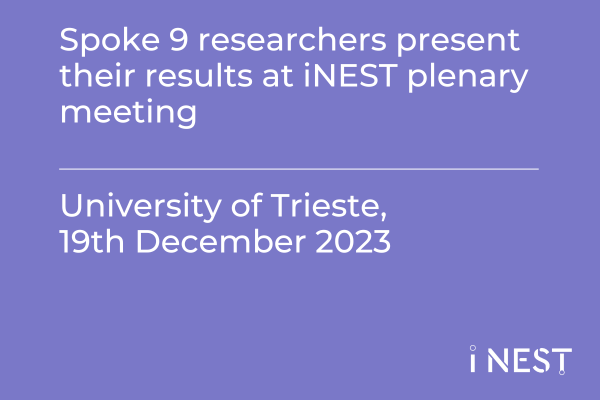
Spoke 9 researchers present their results at iNEST plenary meeting
The meeting was held today, 19th December 2023, at the University of Trieste
Trieste, 19th December 2023
Today, 19th December 2023, the University of Trieste held a plenary meeting about iNEST activities. Spoke 9 was involved in the event, as UniTS is among its partners.
In the morning, after the greetings from Prof. Roberto di Lenarda, the University of Trieste Dean, and Prof. Angelo Montanari, Head of the iNEST Scientific Committee, the activities in which the University of Trieste is involved were shown. Spoke 9 was presented by Prof. Luca Bortolussi, who focused mostly on the applications of Digital Twins to various sectors: manufacturing and energy, environment, and smart cities. The research and development of such applications is the main goal of Research Topic 4.
The plenary meeting continued in the afternoon, with parallel sessions in which students and researchers from each Spoke managed to showcase the results of their work.
The first to talk during the Spoke 9 parallel session was Dario Coscia, a PhD student from the SISSA mathLab group. Coscia presented a talk about GAROM (Generative Adversarial Reduced Order Model), a new approach for solving differential equations using neural networks. Indeed, as he explained, «Differential equations are used to describe the evolution of many systems, such as heart dynamics, weather prediction, car design, and the atomic structure.» Neural networks make it possible to obtain their solutions in a relatively short amount of time.
The following presentation, concerning learning-based approaches to predictive monitoring, was delivered by Francesca Cairoli, Assistant Professor at the Department of Mathematics and Geoscience of the University of Trieste. Predictive monitoring aims to forecast future outcomes, e.g. in business; however, its approximate results «cannot be trusted in safety-critical applications,» as Cairoli stated. Learning-based approaches provide «a better balance between computational efficiency provided by neural networks and the reliability of predictions.»
It was then the turn of Laura Meneghetti, a post-doctoral researcher of the SISSA mathLab group. Meneghetti’s presentation focused on a new approach to reduce the computational demand of convolutional neural network (CNN) algorithms. CNNs, indeed, are used in several applications: «A typical problem is that of image recognition,» explained Meneghetti. Together with her group, she developed a method, based on Reduced Order Models, «to move our well-performing model from a computer with high computational power to a device characterized by limited hardware.»
Erica Salvato, Assistant Professor at UniTS and part of the Control@UniTS research group, concluded the parallel session of Spoke 9. Salvato’s group managed to find a new way to obtain closed-loop control laws, a particular class of mathematical laws that characterize the behavior of various systems, in the form of linear dynamic controllers. In the words of Salvato, «many systems are described by linear laws»; the results of her group could then make the description of systems characterized by closed-loop control laws easier.






